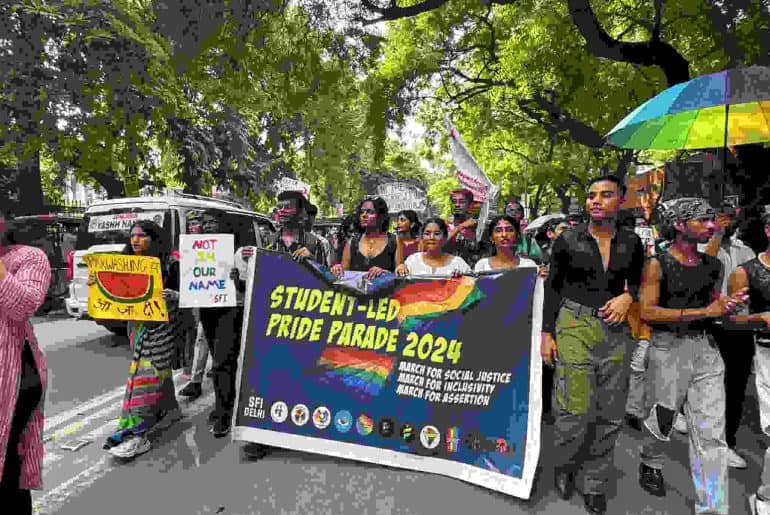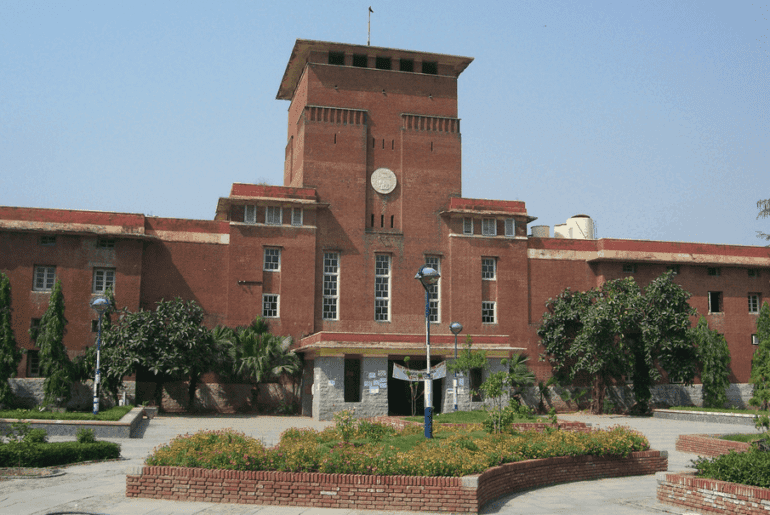On 6 September 2024, SFI Delhi organised a Pride Parade at the Arts Faculty, in collaboration with Queer Collectives from across Delhi. The rally condemned the discrimination and injustice faced by women and the Queer Community across educational institutions in India.
On 6 September 2024, SFI Delhi called for a Pride Parade—commencing from the Arts Faculty. The march denounced discrimination, demanding Queer Liberation, inclusive campuses, and equality for all. Sheets were handed out to the hundreds of students in attendance, with SFI putting out their demands in their ongoing efforts for a safer, more equitable campus. Among the demands were horizontal reservation for transgender students, establishing gender-neutral bathrooms, and a Gender Sensitisation Committee Against Sexual Harassment (GCASH) for affected students to put in their grievances and receive assistance.
When asked about what pride means to them, Ojaswi, a second-year student of mathematics from Deshbandhu College, remarked,
Pride means being at peace with existing in this world,” while for Nandini Das, a student from Miranda House, it meant “finding a community that is inclusive and accepting.”
One female police officer stationed to manage the march, when asked about the march taking place alongside the DUSU elections, shared,
We are on duty here from 9 in the morning to ensure no issue happens and there are other staff taking care of the DUSU rallies.”
Some of the slogans and sentiments that remained constant throughout the demonstration were:
Inquilab Zindabad;
Teri Mukti Meri Mukti Queer Mukti;
This queerphobic government isn’t going to last another term.”
These sentiments and statements echoed throughout the march, with discontent with the government and its policies being quite apparent.
While discussing how being queer shaped the experience of being at Delhi University, Ojaswi shared,
As a visibly queer and trans student, navigating spaces in the college can be scary because it would take only a second for me to get discriminated against.”
They elaborated on how the queer collective at Deshbandhu College is very recent, which added to the difficulty and finding spaces within the university. They said, “I had to figure out how to navigate college while also having to be good in social situations.”
When the conversation turned to the internet and how social media affects the attitudes towards queer acceptance and organising the queer movement, a student from IPCW remarked,
While social media has made people aware and given us a freedom of expression, the same freedom of expression has enabled people to spread hate and bully others online.”
A while ago there was a huge wave of acceptance and support for the message of ‘love is love’, but now homophobia and misogyny have returned on these platforms, making them inaccessible.” – Nandini Das
The message ultimately was that everyone deserves to be freed from all forms of pain, no matter who they are or where they come from. “We’ll snatch back our freedom ourselves” was one of the strongest slogans that was echoed, reflecting how frustrated and disillusioned people have gotten towards the incumbent. Wanting to liberate themselves then signified a sense of urgency to take matters into their own hands for changes.
When asked about their views of the future of the queer movement in the country, particularly in the context of students, Gouri, a first-year student from Lady Shri Ram College, described herself as “consciously hopeful” despite the “negative trend of dismissive and insulting attitudes of the youth towards queer acceptance.” Ojaswi, too, described themselves as “hopeful but cautious as the political situation in the country is not very favourable for queer people.”
The ironic juxtaposition of the hundreds of ABVP banners under which the march was taking place was brought up to which Haya, another first year student from LSR, observed,
While it is ironic, it is also empowering to be under these flags and still be out and proud, wearing all these clothes and expressing ourselves in this way while standing under ABVP flags.”
Read Also: The Politics and Party of Pride
Disha Bharti
Yash









